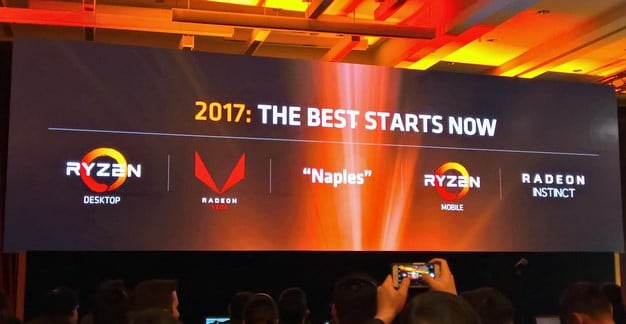AMD Demos Ryzen 7 Benchmarks Smoking Intel, Reveals Chip Details, Clock Speeds, And Pricing
AMD President and CEO, Dr. Lisu Su, took to the stage at AMD’s Ryzen Tech Day and opened the event with some official speeds, feeds, pricing information, and benchmark scores from the company’s upcoming Ryzen series processors. To date, we’ve seen a number of leaks with related data and benchmarks, but the numbers and information we’ll be presenting here are straight from AMD – they are the real deal, not rumors or speculation. And we’ve got a couple of surprises and new pieces of information to share as well.

As most of you probably know by now, AMD’s stated goal with Ryzen – which is based on AMD’s Zen microarchitecture -- was a 40% IPC (instructions per clock) uplift, with competitive frequencies, and power characteristics. Dr. Su, however, disclosed that AMD was actually able to increase IPC by approximately 52% with the final shipping product, sometimes more depending on the particular workload. We have said on a few occasions that a 40% IPC uplift wasn’t going to be enough to take on Intel at the high-end, but it appears AMD was being ultra-conservative with that 40% estimate. Intel has improved IPC by a few percentage points every generation for a number of years, which have resulted in some hefty aggregate performance gains for Core i-series processors. With a 52%+ IPC uplift per core, however, AMD is in a much stronger position moving forward, especially since Ryzen is a first generation part and the company will almost certainly have room to further optimize performance and power over time.

Dr. Su also showed the first high-resolution die shot of a production 8-core Ryzen processor. She disclosed that 8-core / 16-thread Ryzen processors consist of approximately 4.8 billion transistors and feature roughly 2000 meters of signal wiring. As we’ve mentioned in the past, Ryzen is a completely new design that was over 4 years in the making. Dr. Su said that every part of the design, from the cores, to the cache, to the process technology, and even the physical layout has been optimized through the design cycle for both performance and power. Every Ryzen processor that ships to retail will also have the Ryzen logo etched into the lid, but you probably already knew that if you’ve been paying attention to our news page…

The final speeds, feeds, and pricing for a couple of Ryzen 7-series processors was also disclosed. We can now officially report that the Ryzen 7-series will consist of 8-core / 16 thread parts, from top to bottom. The flagship member of the line-up is the Ryzen 7 1800X. The 1800X will have a base clock speed of 3.6GHz, a boost clock of 4.0GHz, and a 95 watt TDP. AMD claims the Ryzen 7 1800X will be the fastest 8-core desktop processor on the market when it arrives. The next member of the line-up is the Ryzen 7 1700X. The 1700X has a base clock of 3.4GHz and a boost clock of 3.8GHz, also with a 95 watt TDP. The Ryzen 7 1700 – sans X – is also an 8-core / 16-thread CPU, but it has lower 3.0GHz base and 3.7GHz boost clocks, along with a lower 65 watt TDP.
Check Out AMD Ryzen In Action, Benchmarked Live Vs Intel Core i7 Processors
Pricing for the three initial Ryzen 7 series processors will undercut competing Intel processors by significant margins. The Ryzen 7 1800X will arrive at $499, the Ryzen 7 1700X at $399, and the Ryzen 7 1700 at $329. Throughout its presentations, AMD has compared the Ryzen 7 1800X, 1700X, and 1700 to the Core i7-6900K, i7-6800K, and i7-7700K, respectively. Based on current street prices, Ryzen will be between 20% - 50% lower priced. But the kicker is, AMD is claiming performance that’s significantly better than Intel in some instanced -- especially when comparing the 8-core Ryzen 7 1700 to the Core i7-7700K.
Ryzen motherboard pricing is also relatively affordable. Most of AMD's board partners have an array of Ryzen motherboards on the way, with prices ranging from about $90 - $95 at the entry-level to roughly $230 - $260 at the high end.

In another test, AMD wanted to show that Ryzen has more than enough horsepower to keep a high-end graphics configuration fed with data. Two system were set up side by side, powered by a pair of Radeon RX 480 GPUs, and either an Intel Core i7-6900K or AMD Ryzen 7 1800X, running Sniper Elite 4 at 4K resolution. Both systems ran the game smoothly and pumped out 75+ frames per second, though the AMD rid showed spikes into the 80 FPS range.

Check Out That New Radeon Vega Logo...
There is still a lot more Ryzen information coming down the pipeline that we can’t quite disclose just yet. But, if you’re already convinced and are itching to get your hands on Ryzen, we have some more news. Pre-orders for AMD Ryzen 7 series processors actually starts today, with wide availability coming on March 2. AMD has lined up 185 retailers and boutique system builders for the launch in many regions around the world if you simply cannot wait and want to get in line for Ryzen. If you can wait, however, our full, independent review will be live in the not too distant future. Not surprisingly, Intel also suggests taking a wait and see approach.
As we were working on this story, an Intel spokesman sent this quote, "We take any competition seriously but as we’ve learned, consumers usually take a ‘wait and see’ approach on performance claims for untested products. 7th Gen Intel Core delivers the best experiences, and with 8th Gen Intel Core and new technologies like Intel Optane memory coming soon, Intel will not stop raising the bar.”
However things ultimately shake out, renewed competition in the desktop processor space is good for everyone.



